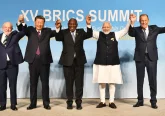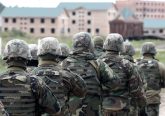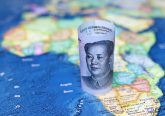On 26 July, Niger’s presidential guard launched a coup against President Mohamed Bazoum, announcing their seizure of power in a televised broadcast. As the dust of the coup begins to settle, Niger — and the international community — stand at a crossroads. The military junta’s success in maintaining power is far from guaranteed and has been widely condemned. Several states and supranational organisations, including the US, France, the EU, the Economic Community of West African States (ECOWAS), and the African Union (AU) have threatened the military junta with sanctions if it does not reinstate President Bazoum, and have even considered military intervention.
However, the Sahel’s track record of successful coups suggests that Niger is likely to see further democratic backsliding, domestic unrest, and a curtailment of civil liberties. The junta’s consolidation of power could mark the end of democracy in a region beset by internal turmoil. To prevent further domestic and regional unrest, the West must take urgent steps to establish pro-democracy mechanisms and look beyond the military sphere to the broader socio-political landscape of the region.
The recent coup in Niger follows a series of military takeovers in neighbouring states since 2020, including in Burkina Faso, Chad, Guinea, Mali, and Sudan. Some have referred to this pattern as a “coup contagion”, but it is important not to oversimplify the security and governance context of each country. Coups can be driven by a number of factors, including the failure of governments to meet the needs of their people, power struggles between different factions within the ruling elite, regional or ethnic tensions, ideological conflicts, and external influence from the opportunistic ambitions of individual leaders or groups. While the national coups have had similar knock-on effects across the region, their causes vary from country to country. In the case of Niger, the coup was the result of several complex factors, including the presence of insurgent and extremist groups, ethnic tensions, and the failure of foreign intervention.
Niger: A Beacon of Democracy under Threat
Niger’s coup came as a surprise to many in the West, who saw the country as a democratic bulwark in the Sahel. But the country’s democratic status is notably recent, with President Bazoum’s election in 2021 marking the country’s first successful democratic transfer of power since gaining independence from France in 1960. At a US-Africa summit last December, Bazoum was honoured with a seat next to President Biden. In March, US Secretary of State Antony Blinken cemented ties with Bazoum’s government during a visit to Niamey, Niger’s capital, offering $150 million in humanitarian aid for the Sahel. At a press conference, Blinken praised Niger as a “young democracy in a challenging part of the world,” and commended its commitment to defending democratic values in neighbouring countries.
Although Niger’s coup plotters cited a “continued deterioration of the security situation” and “poor economic and social governance” as reasons for their military takeover, other underlying issues have contributed to the country’s democratic fragility. The rise of insurgent groups, mainly linked to Al-Qaeda, the Islamic State, and Boko Haram, has led to thousands of civilian deaths and displacements over the past decade. Longstanding ethnic tensions have also challenged the legitimacy of President Bazoum, who is from Niger’s ethnic Arab minority and has been labelled a “foreigner” by the larger ethnic groups that make up the majority of Niger’s military.
The presence of foreign military troops and bases throughout the country has also contributed to the destabilisation of government-military relations. Over the last decade, multilateral efforts led by France, the US, the EU and the UN have attempted to quell Islamist extremism and contribute to stability in the Sahel. After an eight year-long effort, France’s counterinsurgency Operation Barkhane ended in February 2022, following a breakdown in diplomatic relations between Mali and France. Mali’s military junta blamed France for failing to remove jihadist groups from its former colony and claimed that it had no choice but to seek help from other partners like Russia’s Wagner Group, with dire consequences for civilians.
Like France, the US has focused on the use of military force in the ongoing “war on terror” in the region. In 2007, the Pentagon established Africa Command (Africom) to train and equip government special forces in the Sahel. In 2019, the US established a drone base in Niger despite widespread civilian protests. Rather than preventing further insurgencies, experts have warned that the drone base could make Niger a target for extremists and increase regional instability.
The European Union’s “Sahel strategy” has followed a similar path. Brussels launched its Common Security and Defence Policy (CSDP) missions on the principle that providing military support would ensure peaceful solutions. But by ignoring the socio-political specificities of the Sahel states, the EU has inadvertently supported corrupt, illegitimate and/or autocratic governments — with grave implications for regional security and the legitimacy of European policies abroad.
Despite spending billions of dollars, the international community has failed to address the root causes of regional extremism and insurgency. While international assistance has strengthened the capacity of state military and security forces, it has not provided pro-democratic guidance to governments in the Sahel. As a result, civilian confidence in their governance systems has steadily eroded, and people struggle to access basic goods and build secure livelihoods. In the absence of effective international support, local militaries have exploited the growing desperation of local populations and attempted to overthrow their governments in a series of coups.
The West’s Response: Now or Never
While the outcome of Niger’s coup — and the country’s future — remains uncertain, there are evidence-based response strategies that the international community can and should follow. First, it is vital that the West responds now — both to mitigate the coup’s impact on civilians and prevent further escalation of violence. The international community should not pull out of the Sahel as a result of the coup; this modus operandi will only leave a larger power vacuum for both non-state armed actors like Russia’s Wagner Group and anti-Western authoritarian states to fill, as has been the case throughout the Sahel.
Instead, the international community should join forces to broaden its focus beyond the security sphere and help address the root causes of unresolved conflicts. Providing military training and weapons is not enough to help governments combat insurgencies and extremism. To this end, the West should expand its partnerships beyond African elites and ministries to strengthen civil society groups, legislatures, and judiciaries. International partners should also collaborate with African regional institutions — such as ECOWAS and the AU — to help build legislative ties, stronger diplomacy, and peace building initiatives that can both prevent and respond to military coups.
Crucially, these efforts should prioritise the needs of civilians. This can be achieved through inclusive national dialogues that promote local pro-democracy reforms, and information campaigns that help clarify the role of the military to local populations. The effectiveness of certain pro-democracy tools is well-established, particularly the inclusion of minorities and vulnerable groups, civilian control of the military, and governmental accountability guided by civil society.
African voices have long urged the international community to increase private sector investment — rather than “development aid” — based on the rule of law. Security risks in the form of corruption, conflict and cronyism have meant that Africa receives only 3% of global FDI, despite having around 16% of the global population. While foreign investors are rightly concerned about security risks, it is only by strengthening local businesses and civil society that pro-democracy measures can be established. Stronger businesses can spur economic growth, which, in turn, can bolster regulatory frameworks and government transparency. The success of this model has been demonstrated by initiatives such as the US International Development Finance Corporation (DFC), which, over the last year, has provided $37 million in loans to support job creation through small enterprises in Sierra Leone, Guinea, Mali and Burkina Faso, and a $20 million loan to a Liberian bank to improve local entrepreneurs’ access to capital.
Although the DFC is a development institution rather than a long-term mechanism for foreign investment, its creation of local jobs that are mutually beneficial to economic growth and democracy-building offers a salient model for future investors in the continent. Investment in African economies is particularly important in the wake of COVID-19, which has pushed millions of Africans above the poverty line, and Russia’s invasion of Ukraine, which is creating a food security crisis across the continent. By harnessing the local knowledge of civilians, regional institutions, and civil society, investment initiatives like the DFC could be implemented on a much larger scale to help build pro-democracy mechanisms and fortify public trust, preventing future coups and mitigating the damage of those that have already occurred.
Niger’s future, and that of millions of people in the Sahel, remains uncertain. In the immediate term, the West should not disengage militarily, and maintain a presence in the region to prevent further escalation. But in the medium to long term, the international community should broaden its scope beyond security and encourage investment, which would have a wide range of positive knock-on effects. Foreign investment and the rule of law are symbiotic pro-democracy mechanisms that can protect citizens’ rights, reduce corruption, and mitigate the impact of intrastate and interstate conflict. In the geopolitical context of the Sahel — increasingly an arena for great power competition between Russia and the West — this would have innumerable benefits for both Africans and the international community.






